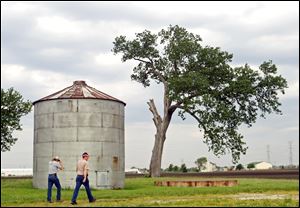
Some shrewd farmers reap from land they sold, bought
6/24/2011
Brothers Bob and Ed Baltz, at their Shorewood, Ill., farm, have been buying farmland left undeveloped after the housing downturn.
CHICAGO -- Farmers, who bet on the weather each growing season, have emerged as the shrewdest gamblers in the housing industry.
A decade ago, they began seeing land values escalate as homebuilders needed raw land to satisfy demand. They sold land to homebuilders at high prices, took their profit, and invested in land downstate in Illinois that they leased to local farmers. Now they are back in Chicago's suburbs, spending a pittance of what land sold for five to 10 years ago, planting crops and profiting from surging commodity prices.
"Farmers have been the wisest investors, especially in the collar counties," said Mark Goodwin, president of Goodwin & Associates. "They were smart enough to hang on to their money and reinvest it in the land. It's like any other business: Invest in what you know."
Brothers Bob and Ed Baltz are two who have capitalized on the dramatic turn of events. More than five years ago, they had all the hard-charging, prominent local and national builders, including Neumann Homes, Del Webb, Centex Homes, and Pasquinelli Homes, knocking on the doors of their farm.
"We had everybody coming in making offers," Ed Baltz said.
The last offer they received, in 2008, never closed, because of the housing industry's crash, but a developer wanted to purchase 600 of their acres in Will County for $72,000 an acre, or more than $43 million.
The two had already sold slightly more than 300 acres outside Chicago, at an average of $25,000 per acre.
They took those proceeds and bought 4,000 acres, in 17 downstate counties, that they rented to other farmers. That left them 1,800 acres to farm corn and soybeans in Chicago's exurbs, including fewer than 1,000 acres they owned.
That's when fate smiled on them.
During the past year, corn prices have doubled on increased demand for use as livestock feed and biofuels, and soybean prices have also risen.
As those prices rose, the Baltz brothers began selling their fertile land downstate that they paid $2,500 to $4,000 an acre for and which is valued at as much as $8,000 an acre. During the past 12 months alone, they've sold more than 2,000 acres. Now they are more active farmers in their own backyards.
During the past three months, they've purchased from lenders almost 1,000 acres of farmland in Will and Kendall counties that were once scheduled for homes, paying a fraction of what developers paid years ago.
On a recent warm afternoon, the brothers stood behind a weathered, vacant white-frame home and barn in Shorewood, Ill., on 246 acres that, at their peak, sold for $65,000 an acre and in 2005 were annexed by the village and zoned for more than 400 single-family detached homes.
The Baltz brothers paid $3.6 million, or about $14,500 an acre, for land that already has subdivision utilities brought to the property line. This year, though, the only thing rising out of the dirt will be the corn Bob Baltz planted last month.
The Chicago-area acreage won't yield as large a crop as the more fertile soil downstate, but the Baltz family is looking past corn and soybeans to the eventual return of home builders.
"Even if corn tanks, it benefits us because we sold high," Ed Baltz said.
"We're more banking on the housing market recovering." But he added, "Until the foreclosures stop and the empty lots are built, I don't foresee this changing."